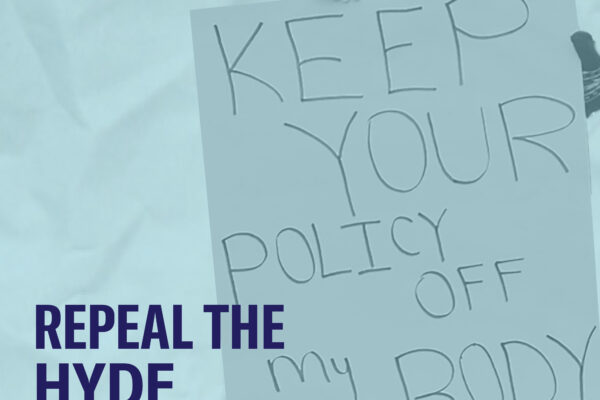The country is closely watching the Supreme Court, wondering what Justice Ruth Bader Ginsburg’s death means for the future of Roe v. Wade and the right to access abortion care. It is important to remember, however, that many people already live in, for all practical purposes, what is a post-Roe world. Depending on where someone lives in the country, their ability to access abortion care may be legal, but limited by real-world obstacles like their ability to pay for care.
Today marks the anniversary of one of the most significant barriers to people seeking abortion care - the federal Hyde Amendment. First passed in 1976, the Hyde Amendment is an annual appropriations measure that restricts the use of federal funds for abortion care. It carves out very narrow exceptions only for cases of rape, incest, or where continuing the pregnancy endangers the pregnant person’s life.
Illinois Congressman Henry Hyde sponsored the law, making very clear that he was targeting “poor women” by cutting off the ability of Medicaid recipients to pay for care. Over the years the Hyde Amendment has been incorporated into various federal programs, restricting care for members of the military, people in federal prisons, the Peace Corps, and the federal employee health benefits program, among others.
The discriminatory and dangerous impact of the Hyde Amendment is dramatic. Because of the way race, ethnicity, and socioeconomic status intersect in this country, it has a disproportionate impact on women of color. It directly affects people who already face other substantial barriers to accessing health care.
The median cost of a first trimester abortion in the United States is $500, yet 40% of American adults do not have enough savings to pay for a $400 emergency expense. No one should have to choose between putting food on the table and accessing the health care they need.
Fortunately, Illinois lawmakers did what the federal government would not do. In 2017, Illinois passed House Bill 40, a law that makes abortion care available through state Medicaid funds. Unfortunately, Illinois is just one of 16 states that directs Medicaid to pay for this care. In the remaining states, there are 7.5 million women of reproductive age – half of whom are women of color – with Medicaid coverage left to fend for themselves.
It is well past time to repeal the Hyde Amendment. Today, Illinois residents can be proud of Congresswoman Jan Schakowsky and Senator Tammy Duckworth for introducing the federal EACH Woman Act. Not only does this groundbreaking legislation reverse the Hyde Amendment, but it also ensures that every woman who receives care or insurance through the federal government will have coverage for abortion services. The law would make sure that a lack of health insurance does not stop people from accessing the care they need and from making the best decisions for themselves and their family.

